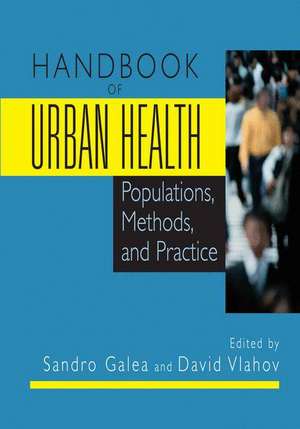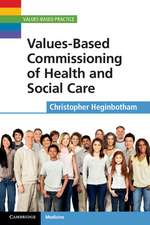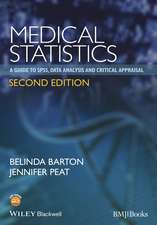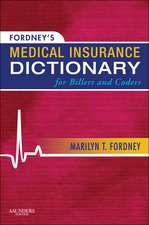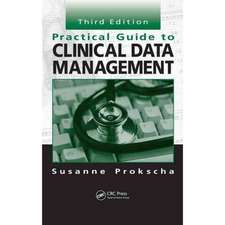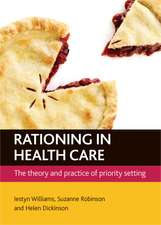Handbook of Urban Health: Populations, Methods, and Practice
Editat de Sandro Galea, David Vlahoven Limba Engleză Paperback – 3 dec 2008
Over forty experts from around the world bring a depth of ideas to the Handbook of Urban Health, making the Handbook a focused resource for a range of health disciplines. The Handbook presents: (1) A discussion of the health of specific urban populations, among them immigrants, children, the elderly, racial and sexual minorities, the homeless, and the poor. (2) Methods relevant to the study of urban health including epidemiology, research methods, funding and policy issues, urban planning. (3) Practical issues for developing healthy cities including interventions, preventive strategies, providing health services, and teaching urban health. (4) International perspectives from developing countries and the World Health Organization. (5) Integrative chapters that conclude each of the book’s sections, bringing together theoretical models with the big picture.
A unique professional idea book, research resource, and teaching text, the Handbook of Urban Health challenges readers to consider the role that cities play in shaping population health and to generate solutions that can make cities healthier places for all those who live there.
| Toate formatele și edițiile | Preț | Express |
|---|---|---|
| Paperback (1) | 867.48 lei 6-8 săpt. | |
| Springer – 3 dec 2008 | 867.48 lei 6-8 săpt. | |
| Hardback (1) | 1128.63 lei 6-8 săpt. | |
| Springer – 21 iun 2005 | 1128.63 lei 6-8 săpt. |
Preț: 867.48 lei
Preț vechi: 913.13 lei
-5% Nou
Puncte Express: 1301
Preț estimativ în valută:
165.100€ • 177.50$ • 138.40£
165.100€ • 177.50$ • 138.40£
Carte tipărită la comandă
Livrare economică 17 aprilie-01 mai
Preluare comenzi: 021 569.72.76
Specificații
ISBN-13: 9780387857701
ISBN-10: 0387857702
Pagini: 599
Ilustrații: XIV, 600 p.
Dimensiuni: 178 x 254 x 31 mm
Greutate: 1.05 kg
Ediția:2005
Editura: Springer
Colecția Springer
Locul publicării:New York, NY, United States
ISBN-10: 0387857702
Pagini: 599
Ilustrații: XIV, 600 p.
Dimensiuni: 178 x 254 x 31 mm
Greutate: 1.05 kg
Ediția:2005
Editura: Springer
Colecția Springer
Locul publicării:New York, NY, United States
Public țintă
Professional/practitionerCuprins
Urban Health.- Urban Health.- Populations.- Homeless People.- Health of Economically Deprived Populations in Cities.- Racial/Ethnic Minorities and Health.- Sexual Minority Groups and Urban Health.- Health and Health Access Among Urban Immigrants.- The Urban Environment, Drug Use, and Health.- The Health of Children in Cities.- Older Adults.- The Health of Urban Populations in Developing Countries.- Perspectives on the Health of Populations in Nepal.- Integrative Chapter.- Methods.- An Anthropological Perspective on Urban Health.- Epidemiology and Urban Health Research.- Design and Analysis of Group (or Neighborhood) Level Urban Studies.- Health Services Research and the City.- Urban Health in Developing Countries.- Urban Sociology and Research Methods on Neighborhoods and Health.- Bridging the Gap Between Urban Health and Urban Planning.- Environmental Health Studies.- Cost-Effectiveness Analysis for Urban Health Research.- Integrative Chapter.- Practice.- Building Healthy Cities.- Building Healthy Cities.- Building Healthy Cities.- Teaching Urban Health.- Strategies that Promote Health in Cities.- Providing Health Services to Marginalized Urban Populations.- Integrative Chapter.
Recenzii
From the reviews:
"This book takes a broad view of urban health, emphasizing urban social factors important to population health. The editors successfully bridge urban health inquiry and public health practice by combining descriptions of issues in urban health, methods used in urban health studies, and examples from practitioners.... Promoting health in cities requires an appreciation of the multiple levels of determinants that shape population health, and this handbook is a good starting point for such appreciation." (Tord Kjellstrom, Visiting Professor of Swedish National Institute of Public Health and Visiting Fellow at the National Centre for Epidemiology and Population Health, Australian National University (Environmental Health Perspectives, January 2006)
"Handbook of Urban Health soundly provides the fundamentals on urban health for a wide audience. It will assist health care practitioners in better understanding the strengths and weaknesses of various types of research methods. It is hoped that this book will not sit closed on reference shelves but lie open on desks as it is used to improve the health of all people in our urban world." (Russ Lopez, ScD., MCRP, Journal of the American Medical Association, November 3, 2005)
"With its reasonably complete summaries of current knowledge in the area, it is a useful teaching guide and a well-references resource for students, practitioners, and academicians. It covers a remarkably broad range of topics with brief, mostly well-written overviews by academicians and practitioners from across the United States, and it provides an extensive list of references and resources for each topic for readers who want or need more detail." (Howard Spivak, M.D., New England Journal of Medicine, April 20, 2006)
"This well-written, well-organized edited volume is a fairly comprehensive handbook on both the research methodology and practice of urban health. … This is anexcellent reference book for anyone working on or studying urban health, policy or planning. Summing Up: Highly recommended. Upper-level undergraduates and above." (K. H. Jacobsen, CHOICE, March, 2006)
"This book takes a broad view of urban health, emphasizing urban social factors important to population health. The editors successfully bridge urban health inquiry and public health practice by combining descriptions of issues in urban health, methods used in urban health studies, and examples from practitioners.... Promoting health in cities requires an appreciation of the multiple levels of determinants that shape population health, and this handbook is a good starting point for such appreciation." (Tord Kjellstrom, Visiting Professor of Swedish National Institute of Public Health and Visiting Fellow at the National Centre for Epidemiology and Population Health, Australian National University (Environmental Health Perspectives, January 2006)
"Handbook of Urban Health soundly provides the fundamentals on urban health for a wide audience. It will assist health care practitioners in better understanding the strengths and weaknesses of various types of research methods. It is hoped that this book will not sit closed on reference shelves but lie open on desks as it is used to improve the health of all people in our urban world." (Russ Lopez, ScD., MCRP, Journal of the American Medical Association, November 3, 2005)
"With its reasonably complete summaries of current knowledge in the area, it is a useful teaching guide and a well-references resource for students, practitioners, and academicians. It covers a remarkably broad range of topics with brief, mostly well-written overviews by academicians and practitioners from across the United States, and it provides an extensive list of references and resources for each topic for readers who want or need more detail." (Howard Spivak, M.D., New England Journal of Medicine, April 20, 2006)
"This well-written, well-organized edited volume is a fairly comprehensive handbook on both the research methodology and practice of urban health. … This is anexcellent reference book for anyone working on or studying urban health, policy or planning. Summing Up: Highly recommended. Upper-level undergraduates and above." (K. H. Jacobsen, CHOICE, March, 2006)
Textul de pe ultima copertă
As more people worldwide live in cities, increasingly we need to understand how cities and city living affect population health. Does city living negatively affect health? Conversely, can city living enhance population health and well-being?
Over forty experts from around the world bring a depth of ideas to the Handbook of Urban Health, making the Handbook a focused resource for a range of health disciplines. The Handbook presents:
--A discussion of the health of specific urban populations, among them immigrants, children, the elderly, racial and sexual minorities, the homeless, and the poor.
--Methods relevant to the study of urban health including epidemiology, research methods, funding and policy issues, urban planning
--Practical issues for developing healthy cities including interventions, preventive strategies, providing health services, and teaching urban health
--International perspectives from developing countries and the World Health Organization
--Integrative chapters that conclude each of the book’s sections, bringing together theoretical models with the big picture.
A unique professional idea book, research resource, and teaching text, the Handbook of Urban Health challenges readers to consider the role that cities plays in shaping population health and to generate solutions that can make cities healthier places for all those who live there.
Over forty experts from around the world bring a depth of ideas to the Handbook of Urban Health, making the Handbook a focused resource for a range of health disciplines. The Handbook presents:
--A discussion of the health of specific urban populations, among them immigrants, children, the elderly, racial and sexual minorities, the homeless, and the poor.
--Methods relevant to the study of urban health including epidemiology, research methods, funding and policy issues, urban planning
--Practical issues for developing healthy cities including interventions, preventive strategies, providing health services, and teaching urban health
--International perspectives from developing countries and the World Health Organization
--Integrative chapters that conclude each of the book’s sections, bringing together theoretical models with the big picture.
A unique professional idea book, research resource, and teaching text, the Handbook of Urban Health challenges readers to consider the role that cities plays in shaping population health and to generate solutions that can make cities healthier places for all those who live there.
Caracteristici
Thorough analysis of different populations in urban settings and specific health considerations Useful section on methods for the research audience Applied in nature with section on prevention and interventions There are over 100 urban health centers in North America and there are no thorough, up-to-date resources Includes supplementary material: sn.pub/extras
